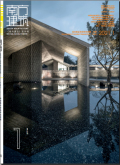南方建筑Issue(1):38-47,10.DOI:10.3969/j.issn.1000-0232.2024.01.005
尺度政治视角下传统村落祠堂功能演变与动力机制
Functional Evolution and Dynamic Mechanism of Ancestral Halls in Traditional Villages from the Perspective of Politics of Scale:A Case Study of Lu's Ancestral Hall in Tangjiang,Jiangxi
摘要
Abstract
Driven by exogenous and endogenous powers,rural spaces have undergone significant reconstruction with China's rapid urbanization.The ancestral hall is the most typical public space in rural communities.Its functions have evolved in complicated negotiations among the state,governments,markets,and villagers.Exploring the multi-governance of rural public spaces has become an urgent need to effectively facilitate revitalization of rural culture.However,existing studies emphasize subjective initiatives of villagers and influences of specific behaviors on ancestral halls,paying less attention to driving forces of their functional evolution. Based on the politics of scale theory,a case study of Lu's Ancestral Hall in Tangjiang,Jiangxi was carried out.Its functional and spatial evolution and dynamic mechanism were analyzed through literature review,field survey,semi-structured interview,and other qualitative methods.Results show that the ancestral hall has evolved in three stages:1)functional evolution from traditional worship and rural teaching to industrial production(1978-2000),2)decreasing industrial production functions and ordered revitalization of traditional worship(2000-2012),and elevation from traditional worship to red tourism(since 2012).The relationship between architectural form and function of ancestral halls has experienced disconnection,misalignment,and alignment.It also drives large-scale development,implantation,and reuse of diversified functions of surrounding traditional buildings and spaces. In the politics of scale framework regarding functions,the vulnerable party(the villagers)reconstructed the scale of the Lu's Ancestral Hall by using vertical scale,horizontal scale,and expression scale,which changed the power relationship between the powerful and vulnerable parties and facilitated functional evolution of the ancestral hall.On the horizontal scale,clan relatives around China are united to reconstruct the property rights of ancestral halls in traditional villages through persuasion,seeking help,and applying pressure to government.Meanwhile,they accelerate the reconstruction of front buildings by combining their development demands and active implementation of local policies.The powerful party(ancestral hall primary school and town government)maintained existing functions of the ancestral hall through conflict transfer,transfer of authority of office,or fixed scale.The third party(municipal government and district government)decided the final trend of power relation reestablishment through policy supply and administrative orders. During the complicated interactions between the Lu Clan,local government,and other action subjects,it was found that the functional evolution of the Lu's Ancestral Hall are mainly driven by interactions between external factors,internal factors,and core factors.External factors(such as industrial development,policy implementation and rapid urbanization)accelerate the functional evolution of the ancestral hall.Internal factors(such as property ownership,space use,ancient building protection and belief in Fengshui)assure the functional evolution of the ancestral hall as prerequisites.Core driving forces(such as villagers and local elites)directly influence functional evolution of the ancestral hall. In rural governance,a key to changing power relations is finding ways the vulnerable party can get support from the higher vertical scale.In this study,the vulnerable party can participate in decision-making of government effectively by using the politics of scale.The independent party composed of capable individuals and local elites plays a crucial role in increasing the right of speech and balancing subjects on the horizontal and vertical scales.The third party on the horizontal scale can attract supports from the vertical scale,because subjects representing benefits of two parties are developing their initiatives.Effective transformation on the horizontal scale requires supports from the vertical scale.In the future,research attention should be given to politics of scale about functional evolution of public spaces in rural areas,especially in ordinary villages.Moreover,the action mechanism of various actors in rural governance should be considered comprehensively.These research conclusions can provide guidance towards better understanding of rural space governance and facilitate rural revitalization in China.关键词
尺度政治/祠堂/功能演变/动力机制/乡村治理Key words
politics of scale/ancestral halls/functional evolution/dynamic mechanism/rural governance分类
建筑与水利引用本文复制引用
黄颖敏,李晴,廖望,曾献君..尺度政治视角下传统村落祠堂功能演变与动力机制[J].南方建筑,2024,(1):38-47,10.基金项目
江西省文化艺术科学规划项目(YG2018242):赣南地区客家围屋保护与利用研究 (YG2018242)
江西省教育厅科学技术研究重点项目(GJJ210802):赣南地区乡村产业振兴现实困境、调控机制与规划策略研究 (GJJ210802)
江西省高校人文社会科学研究规划项目(JC21104):赣南乡村地域系统重构机制与优化路径研究. (JC21104)

